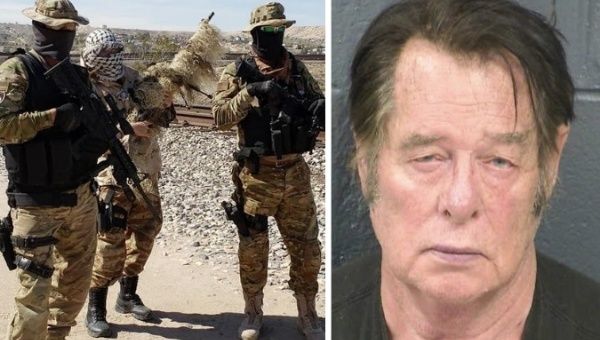The man who belonged to a group that was holding illegal immigrants at gunpoint and was arrested in New Mexico on a firearms offense had been found guilty of the same crime in Oregon 12 years ago.
But Larry Mitchell Hopkins fled without serving his sentence, Klamath County, Oregon, court records show.
Hopkins was sentenced to probation in 2006 in the southern Oregon county after he pleaded guilty to two charges of being a felon in possession of a firearm and impersonating a peace officer.
“Larry Hopkins, who is a convicted felon, was showing two firearms to a group of juveniles,” a police report said. “Hopkins told the juveniles that he was a police officer and was displaying a badge that said ‘special agent.’”
Hopkins had been convicted in 1986 in Michigan of the felony of false pretenses, police in Klamath Falls noted, and that triggered the felony firearms charges in Oregon. Felons in Oregon are in many cases barred from possessing firearms.
Hopkins, who lived at the time in Ashland, Oregon, appeared for only his initial parole meeting.
He never returned.
His parole officer sought his arrest and recommended a 20-month prison sentence, according to court records. A judge in January 2007 responded by issuing a statewide arrest warrant. The arrest order didn’t extend beyond the state. Authorities said such an arrest order is routine for lower-level crimes.
Last year, Klamath County Judge Marci Adkisson dropped the case because a deputy district attorney said the parole violation was “too old to effectively prosecute.”
Adkisson declined to comment Monday on the case.
Hopkins apparently also tried to flee justice on the felony charge in Michigan. Oregon court records show he was charged with being a fugitive from justice and that he was extradited from Oregon to Michigan in 1996.
Hopkins, 69, was charged Monday in New Mexico with being a felon in possession of firearms. The federal charges stem from a search of his New Mexico home in 2017. He was arrested over the weekend near Sunland Park, where he and others members of his group have been patrolling the border and stopping hundreds of migrants. Hopkins’ lawyer said he plans to enter a plea of not guilty at a bond hearing in Albuquerque next week.
The FBI said Hopkins is from Flora Vista, a rural community in northern New Mexico and approximately 353 miles (572 kilometers) north of Sunland Park, which is a suburb of El Paso, Texas.
New Mexico Attorney General Hector Balderas said in a statement that Hopkins “is a dangerous felon who should not have weapons around children and families. Hopkin’s arrest by the FBI indicates clearly that the rule of law should be in the hands of trained law enforcement officials, not armed vigilantes.”
Federal authorities on Friday warned private groups to avoid policing the border after a string of videos on social media showed armed civilian members of the United Constitutional Patriots ordering family groups as small as seven and as large as several hundred to sit on the dirt with their children, some toddlers, waiting until Border Patrol agents arrive.
Customs and Border Protection said on its Twitter account that it “does not endorse or condone private groups or organizations that take enforcement matters into their own hands. Interference by civilians in law enforcement matters could have public safety and legal consequences for all parties involved.”
Jim Benvie, a spokesman for United Constitutional Patriots, did not immediately respond Saturday to a request for comment made via Facebook.
Benvie said in a video that the group’s members were assisting a “stressed and overstrained Border Patrol” and said the group is legally armed for self-defense and never points guns at migrants. The posted videos do not show them with firearms drawn.
Armed civilian groups have been a fixture on the border for years, especially when large numbers of migrants come. But, unlike previous times, many of the migrants crossing now are children.
In the Border Patrol’s El Paso sector, which has emerged as the second-busiest corridor for illegal crossings after Texas’ Rio Grande Valley, 86% of arrests in March were people who came as families or unaccompanied children.
(AP)











